Welcome to Books I Read: April Edition! April passed in a blink, changing life plans and moving and re-finding routine, thirty full days dissipating into mere moments.
My only reading goal this month was to, well, read, AND reach my goal of reading at least four books every month. I got nervous toward the end, having spent the first three weeks with only one and a half books read. But that’s the thing about keeping up with goals. It gives me a bit of an outline, or something to reach for. And as a person who finds solace, relaxation, and restoration in taking time to sit with a book in my hands, paper pages turning one at a time, it’s a way of making sure I have that time I need.
As this is only the fourth time I’ve written a newsletter of the books I’ve read in a month, I want this series to be a brief overview of my experience reading the book, without delving in too deep or specific that I give away any spoilers. I want it to inspire others, to pique interest, enough that you might want to read one too, or perhaps avoid at all costs. But also, it’s a way for me to think about what I’ve read in a way that satisfies the lack of a socratic classroom discussion that I had for years. And hopefully chat with others, too.
Since I haven’t been in office and have found myself wearing the same thing every day, I thought it might be fun to put together outfits inspired by the covers of the books I read this month, inspired by Molly Blutstein’s series, Outfits & Interiors.
All in all, I read 4 total books. I rented 3 from the library. 1 book is mine. And most of these clothes belong to my mom.
Kairos by Jenny Erpenbeck
Greta & Valdin by Rebecca K Reilly
Delta of Venus by Anaïs Nin
Another Word for Love by Carvell Wallace
Kairos by Jenny Erpenbeck
“Kairos, the god of fortunate moments, is supposed to have a lock of hair on his forehead, which is the only way of grasping hold of him. Because once the god has slipped past on his wingers feet, the back of his head is sleek and hairless, nowhere to grab hold of.”
I’d hit a lull, reading little, and in March, when one of my goals was to read books in translation, I immediately put up a barrier to any book that wasn’t an ‘easy’ read. So, I put this one aside. And then I picked it back up. Pittsburgh was printed on the first page, catching my eye. Only a few pages in, I was swept away. The constant dichotomy—what she thinks, what he thinks—creating a visual, relatable experience.
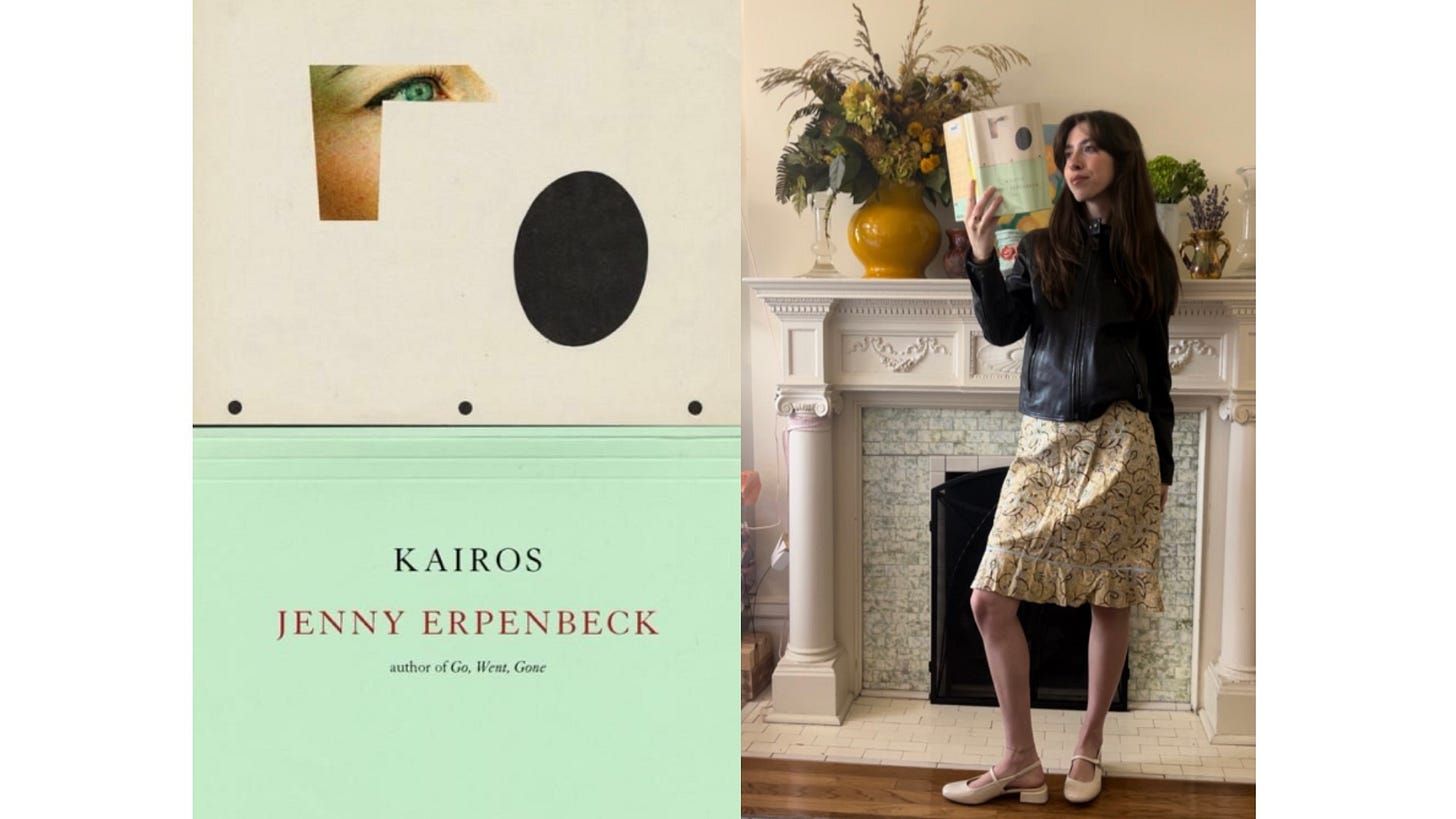
The book begins in the present day, years after, but that’s quickly forgotten. Set amidst the backdrop of East Berlin in the 1980s, the story follows nineteen-year-old Katharina and fifty-something-year-old Hans, married with a son, who meet one day on a bus. A turmoil-ridden affair ensues.
It seems like fate, at first, that they would’ve met, I mean it’s the name of the novel (Kairos). A love divine. How could two individuals have lived before one another, selves now intertwined, like they hadn’t been whole before they’d known the other. I supposed it depends on how you view life, too, whether a chance opportunity, the right place at the right time, could either signify a moment of happenstance or a lifetime of it. The decision to lean into all the factors that led to both characters to find one another, and feel something in gaze only, or to not.
“So they tell each other-and tell themselves—everything about the way it was, three weeks ago, when they first met. Some things they both know, some one of them has forgotten, or the other, some one of them didn’t notice, or the other, some one of them thought but didn’t say, and some the other, and so what was present just three weeks ago deepens in the course of an afternoon, deepens, changes it nature, and yet keeps its overall outline which both of them recognize.”
Their relationship progresses. A heavy emphasis placed on time, the way it’s bent in favor of their relationship, as if it’s dissipated, even failed to exist before, lost in the vacuum of the other.
“When there is silence where before there was sighing and lamentation, two bodies stretched out side by side in the dark. It will never be like this again, thinks Hans. It will always be this way, thinks Katharina. Then sleep puts an end to all thinking, and what happened to them both today is inscribed permanently—while they lie together, breathing peacefully—on each one’s cerebral cortex.”
Once I took a British Romanticism course in college (think Wordsworth, Coleridge, Keats, Lord Byron). We talked a lot about love, and the different types. And how the most powerful love is a secret love. The hidden glances, the adrenaline, the world built up in the mind of those two people, inaccessible to anyone else. And you can feel it, reading. Hans insecure of his grasp on her, the relationship quickly becomes a play of power, and my feelings sticky.
The cadence of the voice was intoxicating for me as a reader. Play-like, a stage divided in two which only the audience can see—both worlds, both speakers—and understand from a third truth. The structure elicits an exhilaration. The intensity of the smallest seemingly insignificant moments created through nuanced imagery.
The time period, too, is fascinating and unfamiliar. I’m not sure I’ve read any sort of historical fiction about characters living in East Berlin. Only being allowed to leave if granted permission, what it was like once the wall came down and all systems of living abruptly changed to mirror those of the rest of the country. My only familiarity is with art created during the time period, thought most of it produced by artists surrounding East Berlin, mostly a critique. But photographer Sibylle Bergemann captured everyday life, rarely allowed to leave, and drawn back by the responsibility of family and friends, similar to Katharina.
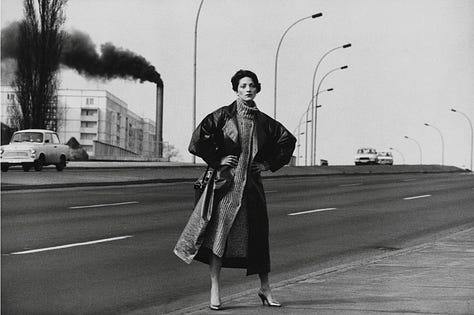

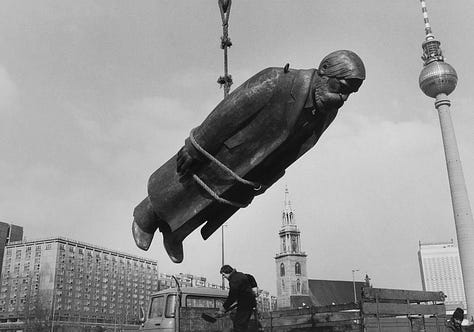
You’d like this if you’re looking for:
A historical fiction novel rich with love and learning what we desire and deserve.
You might also like:
Scaffolding by Lauren Elkin, The Safekeep by Yael van der Wouden, The Copenhagen Trilogy by Tove Ditlevsen
Greta & Valdin by Rebecca K Reilly
“How much does love really matter in this economy?”
My only exposure to New Zealand literature is Katherine Mansfield, a 20th century writer who found inspiration in Virginia Woolf. And so, I was quite excited to read this contemporary novel.
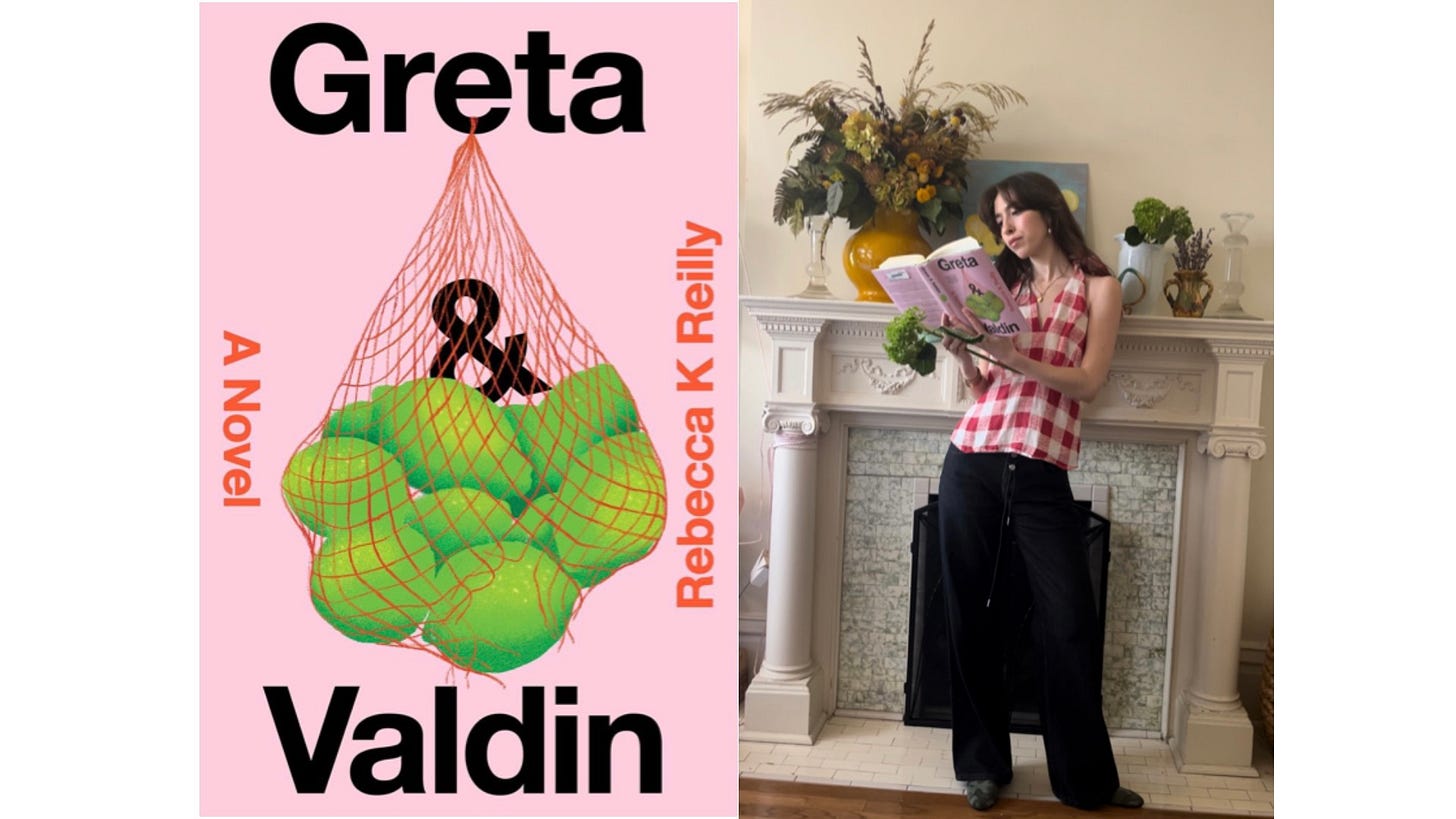
Greta and Valdin are queer twenty-something-year olds living in Auckland, New Zealand with their Russian-Māori-Catalonian family. Greta is getting a master’s degree in Russian literature and Valdin is the host of a travel TV show, a career he assumed after quitting as a physicist a few years before. They are struggling in life and in love. Both in different ways.
“I don't think it should be allowed for anyone to remember me as I was before maybe, like, two years ago. For their sake. Lovely Ben should not have to remember me as a teen Eurovision fanatic who threw out the batteries for the remote so no one could even try to change the channel, and then screamed because I couldn't turn the volume up. These days I'm much more dignified.”
At first, I thought the two main POVs were twins, they way they interacted at an intimate level, always knowing what the other needed and felt. And then, I realized they were a few years apart, and just siblings and roommates.
The extended family was a large part of the novel, everyone relying on one another, and this was refreshing. That it takes a village. But that life is messy and entwined and doesn’t have to be defined and that the one of the best things you can do is make other people feel seen and accepted unconditionally.
“I don’t always love to think about all the tiny pieces of me that add up to make a whole person. I feel concerned that too many of the pieces have something a bit wrong with them.”
While it took me a bit to get into the flow, once I was, a few chapters in, I couldn’t stop. The staccato syntax and double perspective reads like the action cues of a play, every chapter indicating G or V. I read it slightly slower, enjoying the observations of human experience. One of those silly, serious stories I quite enjoy.
You’d like this if you’re looking for:
A contemporary novel with flip-flopping perspectives of two young adults figuring out life and love.
You might also like:
Blue Sisters by Coco Mellors, Martyr! by Kaveh Akbar, Margo’s Got Money Troubles by Rufi Thorpe
Delta of Venus by Anaïs Nin
“I gathered poets around me and we all wrote beautiful erotica. As we were condemned to focus only on sensuality, we had violent explosions of poetry. Writing erotica became a road to sainthood rather than to debauchery.”
I can be naive sometimes. It wasn’t until I opened the book that I realized what was inside. Erotica. I found it quite interesting. The foreword is a collection of diary entries written by Nin describing how this collection came to be: an anonymous wealthy benefactor requesting highly specific erotica short stories from Henry Miller (him and Nan were lovers). And when at some point Miller found himself busy or other writers were looking to pick up some cash, they started writing these short little stories, all of it transacted by a collector.
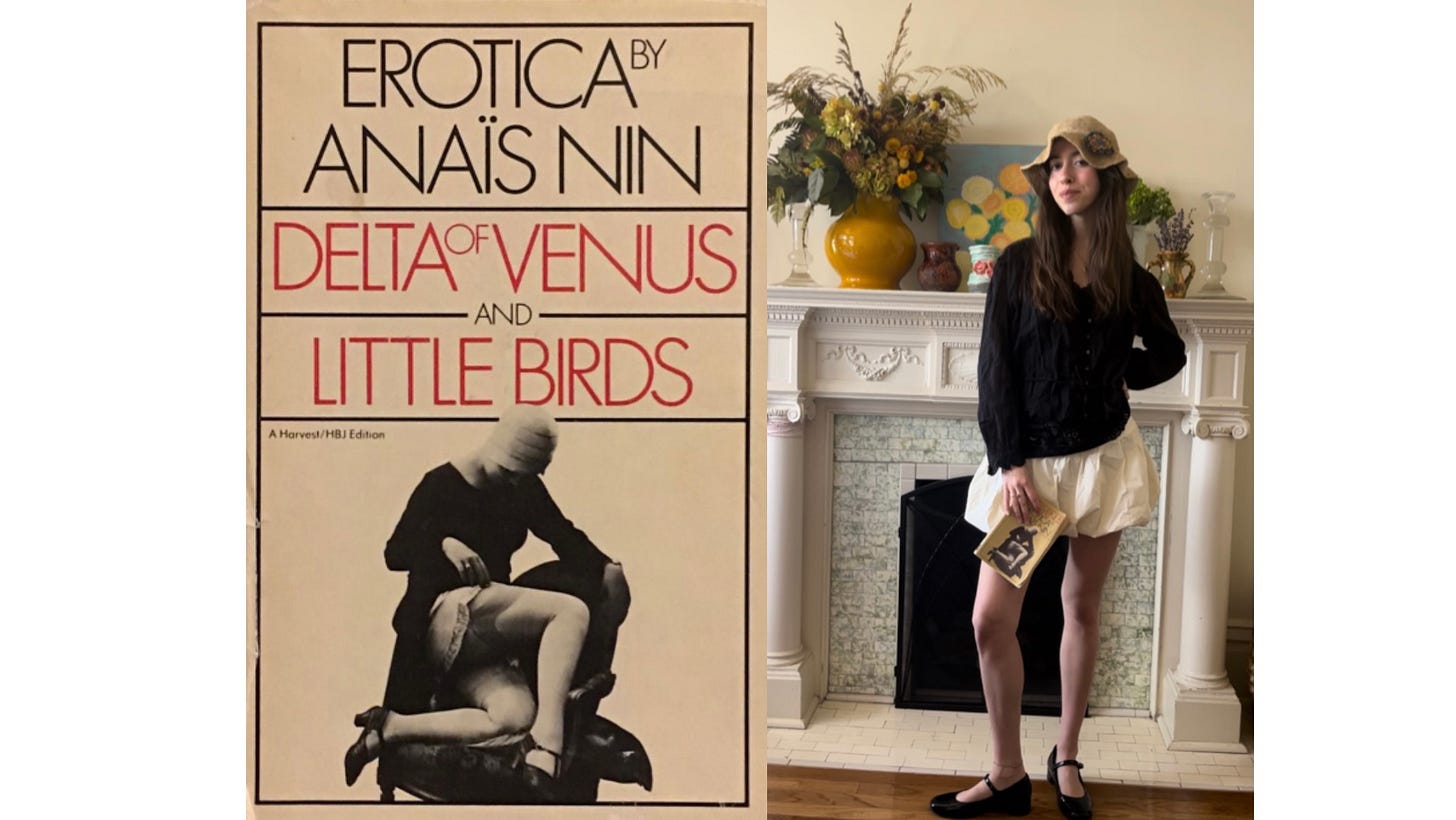
As a writer, it was fascinating because of the form and the intensity and bizarreness of some of the stories—how short some are and how developed they are in that small space. In terms of subject matter, there’s a lot I couldn’t have imagined.
“But did anyone ever experience pleasure from reading a clinical description? Didn’t the old man know how words carry colors and sounds into the flesh?”
I found the introductory diary entries riveting, her exploration of who she was a writer, in a room of male perspectives, especially when it came to writing erotica for a patron with very specific tastes. Her sentences beautiful. The reason I picked up this book was because I’ve been wanting read more Nin, a French-born American diarist, essayist, and writer, and it’s what Google told me to start with.
You’d like this if you’re looking for:
Something steamy? A lesson in short story writing?
You might also like:
You might want to head to literotica.com. if not: Land of Milk and Honey by C Pam Zhang
Another Word for Love by Carvell Wallace
“Wandering in vastness and light, weaving between knowing and never knowing, trying to see everything there is to see, trying to be far enough away to understand and close enough to grieve. I return again and again, for after everything else has been lost, return is all I know of love.”
I got this book as a gift over the holidays. It had been on my radar because the author had grown up in parts of Pittsburgh; and if there’s anything that convinces me to read something, that’s it. I’m sure most people feel this in some way about the place they’re from, but there’s something else about it that I haven’t quite found anywhere else.

Carvell Wallace is now an Oakland-based writer whose work spans celebrity profiles, ghostwriting, podcasts, and essays. His memoir is structured in three parts, followed by a postscript.
The first two parts resonated with me the most. He writes about his childhood that offered no real sense of stability, and then the years of growing up, of becoming an adult too soon. He explores how he was taught to view love, family, sex, race, and what it means to make your way through the world alone,
I read the book on a rainy Saturday afternoon, and it felt right. It’s a memoir about love, but not in its typical manner. It’s about Wallace’s experience and understanding of love, how it’s always in something else: return, beauty, absence, healing. The stories are generous in vulnerability, poetic in its reach. He leans heavily into literary devices like metaphors or similes or imagery that sometimes worked and sometimes didn’t, for me.
“That was the key, you see. You had to pay attention to everything. Every bite, every sip, every moment of fatigue and hope on the blazing and smoggy concrete and stucco. It might be all you would ever have. You had to know how to make it last.”
Uncertainty ruled not only his childhood but lingered well into adulthood, while relying on the idea of eventual return, as another word for love. That whatever good you have, not only grasping onto it but doing everything you can to preserve it. Just in case it doesn’t last.
You’d like this if you’re looking for:
A memoir on learning what love means through family, queerness, race, and happenstance.
You might also like:
Small Rain by Garth Greenwell, The Ghost Writer by Philip Roth, The Mysteries of Pittsburgh by Michael Chabon
Questions
What was your favorite read in April?
For library book borrowers! How do you underline or notate? (I’m having a hard time remembering the moments that resonated with me while reading.)






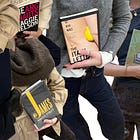
I’ve subscribed for awhile & I finally have to comment - I’m obsessed w ur book/outfit pics. Such a chic concept I love it